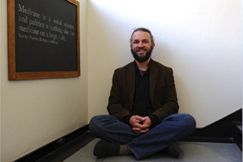Ivy League school joins UCT to fight HIV
6 November 2013
The University of Cape Town has teamed up with US Ivy League school Brown
University to develop a new cadre of HIV social scientists who can provide
sustainable, interdisciplinary solutions to HIV/Aids in South Africa, where one in six
adults has HIV.
Around 6.2-million South Africans live with the disease - the world's largest HIV-positive population.
The project, named "Partnership for the Next Generation of HIV Social Science in
South Africa", will see the social sciences playing a greater role in the response to
HIV. It will be run in UCT and Brown's public health schools, and will be funded by the National Institute of Health at a cost of US$1.9-million over five years.
The co-principal investigator from UCT is senior researcher Dr Christopher Colvin, an
anthropologist in the Centre for Infectious Disease Epidemiology and Research
(CIDER) in the School of Public Health and Family Medicine.
Colvin's work
integrates social science perspectives into public health research on
HIV/Aids, gender, community health workers and health activism.
"The social science and public health responses to HIV have both been tremendously important, and many at UCT are at the forefront of this research," says Colvin.
"However, these responses have often developed in parallel, rather than in close
collaboration. This grant aims to integrate the social sciences into the core of our
public health teaching and research on HIV in the school."
Brown's participation will be led by South African-born Professor Mark Lurie, who has studied sub-Saharan Africa's HIV epidemic for more than a decade.
Opportunity
"The new grant is a wonderful opportunity for Brown to contribute to training the next generation of South African social scientists, whose work is aimed at better
understanding and preventing HIV infection in the country with the most severe
epidemic," says
Lurie.
The partnership will contribute to curricular development, training and professional
development through collaborations with HIV-focused social and behavioural scientists at Brown.
Outside of the classroom, it will also create opportunities for collaborative,
interdisciplinary and innovative research in HIV social science, particularly at
postgraduate and postdoctoral levels.
Edited version of a story first published in UCT's Monday
Monthly. Published here with kind permission.
 Body imaging: drawings by HIV-positive patients (Image: CIDER)
Body imaging: drawings by HIV-positive patients (Image: CIDER)




